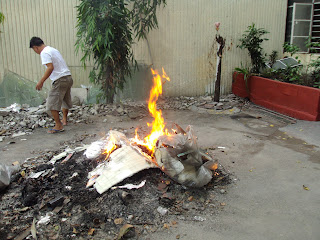Brigada Eskwela Participants Told: Don’t Burn Trash, Don’t Use Lead Paints
A waste and pollution watch group urged
participants of this year’s Brigada Eskwela on May 30 to June 4 to clean and
beautify the country’s public schools in a way that will not put human health
and the environment at risk.
As schools gear up for the annual sprucing up, the EcoWaste Coalition reminded
participants to ensure that wastes collected from the week-long clean-up drive
are not burned and that lead-free paints are solely used for school
renovations.
“Burnish trash and using leaded paint must be avoided all the time as these
practices can contaminate the school environment with health-damaging
substances,” said Thony Dizon, Coordinator of the EcoWaste Coalition’s Project
Protect.
The group reminded school principals, teachers and the general public that open
burning is prohibited under the Republic Act 9003, the Ecological Solid Waste
Management Act and that the use of lead-free paints is prescribed under the
Department of Education Memorandum No. 85, Series of 2016.
Unknown to many, the burning of discards discharges microscopic toxins that can
trigger headaches, cause eye, throat and skin irritation, weaken respiratory
functions, cause asthma and heart attacks, bring about reproductive disorders,
and even result in cancers, the group pointed out.
On the other hand, coating school walls, doors, windows, chairs, tables and
other fixtures with leaded paints creates a lead poisoning hazard as the
painted surfaces will chip and deteriorate over time, dispersing
lead-containing paint flake and dust that can enter the human body via
ingestion or inhalation, the group added.
According to health experts, the brain damage caused by chronic and low-level
exposure to lead, a potent neurotoxin, is irreversible and untreatable.
Disturbing lead painted surfaces through dry sanding or dry scraping will
create enormous amounts of lead dust and should also be avoided, the EcoWaste
Coalition likewise said.
Instead of simply mixing or setting them on fire, the group urged Brigada
Eskwela partakers to recycle or reuse the non-biodegradable discards and to
compost the biodegradable discards.
As for the paints, the group advised Brigada Eskwela volunteers to use
water-based paints whenever possible and, if oil-based paints are required, to
choose lead-free brands.
The group offered the following tips towards a waste-free and toxic-free
Brigada Eskwela:
1. Opt for reusable or recyclable containers for volunteers’ drinks and foods
to reduce trash.
2. Separate discards at source to keep the volume of residual trash
to the minimum.
3. Reuse, recycle and compost discards instead of burning
them.
4. Do not dispose of busted mercury-containing fluorescent lamps in
ordinary trash.
5. Use safer cleaning agents and avoid hazardous ones such as muriatic acid,
oxalic acid and dichlorobenzene.
6. Apply lead-free paints for school interiors, exteriors, furniture
and fixtures.
7. Avoid dry sanding or dry scraping painted surfaces that might contain lead
so as not to disperse lead dust into the surroundings.
8. Keep children and pregnant women out of the work area (lead is very
hazardous to unborn children).
9. Thoroughly wash hands with soap and water before meals and after the work is
done.
10. After a repainting job, change clothes before going home, set aside in a
sealed reusable bag and wash separately.
-end-






Comments